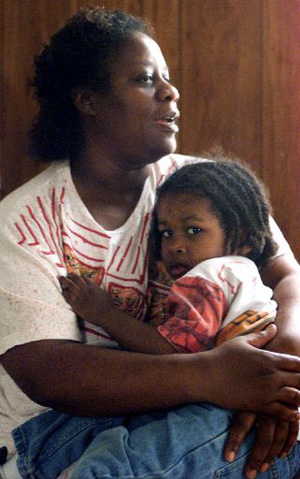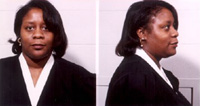Criminal record doesn't disqualify foster parents
Child advocates say it's a symptom ofmisdirected system
By Debra Jasperand Elliot JaspinDayton Daily NewsPublished: Tuesday, September 28, 1999, Page 4A
Sidebar to Part 3
Adams, a Cleveland woman who has taken care of 38 foster children in the past 11 years, has a house full of kids and toys -- even rabbits who nibble on pellets in the front foyer. She said her foster children have given her strength during the rough times.  CLEVELAND -- If you only looked at the police mug shot of Diane Adams, you wouldn't get the full picture.
CLEVELAND -- If you only looked at the police mug shot of Diane Adams, you wouldn't get the full picture.
 JAN UNDERWOOD / DAYTON DAILY NEWS DIANE ADAMS, 39, and her adopted son, Travis, in their Cleveland home. Adams has taken care of 38 foster children in the past 11 years, and Travis was a foster child before his adoption. |
The 39-year-old foster mom also has a criminal record. She pleaded guilty in 1994 to charges of theft and attempted trafficking of food stamps. The judge suspended a prison sentence and ordered Adams to pay restitution and complete a year and a half of probation.
Despite the conviction, Cuyahoga County continued to put foster children in Adams' care -- and into the care of at least three other county residents with criminal records, a Dayton Daily News computer analysis shows.
In the past 10 years, these foster moms have been convicted of charges ranging from attempted grand theft and food-stamp trafficking to receiving stolen property, records show. They are only three of dozens of names that surfaced when the newspaper compared a list of 10,000 foster parents in Ohio with the names of adults charged with crimes.
Because the names of parents and children can be identical, it's difficult to determine exact figures based on computer data alone. But a random check of eight computer matches in Cleveland found that half were foster parents with criminal records.
The numbers did not surprise Laurel Conrad, spokeswoman for Cuyahoga County Children Services. "I'd venture you missed a few," she said. "I know a lot more than that with criminal backgrounds. They just aren't as recent as the ones you found."
Faced with a growing shortage of foster parents and 6,000 children to place, Conrad said the county cannot be too choosy about an applicant's criminal history. As it is, the county already rejects almost three-quarters of its applicants.
"If you eliminate everybody who has a history off the bat, it makes it so much harder to find foster families," she said.
Under Ohio law, Conrad said, having a record does not automatically bar someone from being a foster parent. The law says people convicted of misdemeanors must be out of jail for three years before accepting foster children; felons must be out of jail for 10. The law does prohibit people with certain convictions -- crimes against children, for example -- from working in foster care.
 DIANE ADAMS in a police mug shot. |
"We believe that removing any of the children, at this time, would not be in their best interest," she said.
Child advocates say the need to place foster children with people convicted of crimes illustrates just how severe the foster parent shortage is in this country.
In Ohio alone, the number of foster cases has almost tripled in the past decade, to 32,000 in a year. The figures are just as stark nationwide. Since 1986, the number of children in foster care has risen 90 percent, to more than half a million. Yet the number of foster homes during that period has decreased by 3 percent.
Richard Wexler, director of the National Coalition of Child Protection Reform in Washington, D.C., questioned why governments will spend thousands of dollars a year to take children away from their own troubled homes only to place them with possibly troubled foster parents.
"It's ironic. The argument the system makes for endlessly removing children is ‘don't take chances.' So why take a chance on foster parents with criminal records?"
Wexler said he has no doubt some of those people can turn their lives around and do a good job raising children.
The real issue, he said, is that if social workers were to help biological parents straighten out their lives, it would not be necessary to recruit foster parents who need rehabilitation. Children should not be taken from their homes and put into a system that has few places for them, he said. "In effect, what (officials are) saying is we have to scrape the bottom of the barrel because we have a serious shortage of foster parents," Wexler said.
Adams could not be reached for a follow-up interview to discuss her record, once her conviction was confirmed. But the single mom said she didn't know what she would do if the county stopped placing children in her home.
Adams, who raised four of her own children, recently adopted four of the foster children placed in her home -- the 3-year-old and three 7 year-olds.
"I hear a lot of people saying, ‘I don't want to get in foster care because I don't know anything about the kids.' To me, these kids need a lot of love," Adams said.
She said she hopes to spend the rest of her life raising children. "When these babies are 16, I'm going to do it again," she said.
Main story:
Trading at the child-care bazaar
Governments, agencies and parents haggle over the price of caring for kids.
By Debra Jasper and Elliot Jaspin - Dayton Daily News
Published: Tueday, September 28, 1999 ; Page: 1A
Part 4:
Incentives for reform ar few and feeble
Flow of government cash overwhelms the urge to overhaul
By Debra Jasper and Elliot Jaspin - DAYTON DAILY NEWS
Published: Wednesday, September 29, 1999, Page 1A